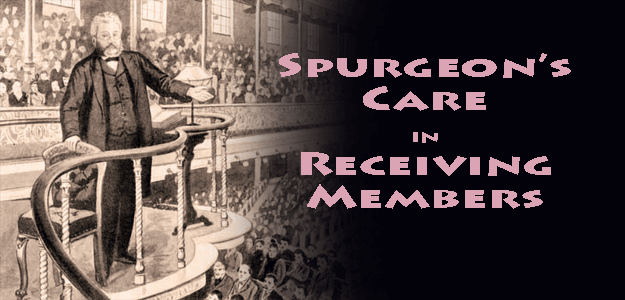
Charles H. Spurgeon began pastoring the Metropolitan Tabernacle of London, England, in 1854 at age 20, and was the senior pastor until his death in 1892. His superlative preaching drew massive crowds, and the church grew from “a handful” to a membership of over 5,300.
The church was cautious and wise in receiving members. Many applied for baptism and membership, and the church wanted to be as sure as possible that the individuals were saved. A group of elders and deacons assisted Spurgeon in counseling prospective members.
They looked for certain evidences of salvation. They looked for undivided trust in the blood of Christ and in the grace of God with zero confidence in one’s goodness or works. They looked for a changed mindset, a change of direction, a change in the individual’s loves. They looked for a change in attitude toward the wicked things of the world, and they looked for a change in attitude toward the church and faithfulness thereto. “Their new Christian instinct should be seen--to assembly together whenever possible.”
The thing that stands out was that they were patient. They were not in a hurry to pronounce individuals saved and to baptize them. It was the opposite of the methodology I call “quick prayerism.” They wanted things to be clear. They wanted to have confidence in the individual’s profession and testimony. If they counseled someone and things were not clear, they tried to help the individual by assigning him or her to get further counsel, to read certain selections from the Bible or certain sermons, or to attend a certain Bible class.
By being cautious, they were not keeping anyone from Christ. They never discouraged anyone from trusting Christ as Saviour. In fact, that’s exactly what they constantly urged the people to do. That’s what they wanted to see. They weren’t keeping people from Christ; they were simply trying to ascertain if they did indeed know Christ savingly, which is God’s own standard and requirement for baptism and church membership. See Acts 2:41-42.
As in our day, there was a lot of confusion about salvation in London in the last half of the 19th century. There was Romanism with its sacramental gospel and priestcraft. There was Anglicanism with its sacramentalism and nominalism and theological liberalism. There was Quakerism with its heresy of “inner light.” There was humanistic skepticism. There was Darwinism. There were the budding cults. There was Methodism with its infant baptism and confusion about security in Christ and perfectionism.
As today, Metropolitan Tabernacle in Spurgeon’s day was Calvinistic in theology, but Spurgeon preached a “whosoever will” gospel, called all sinners to Christ, and was very aggressive in evangelism. For this he was sharply criticized by those who have been called “hyper-Calvinists.” For ourselves, we aren’t any kind of Calvinist, believing that John Calvin was an unsound and misguided theologian who, by his own testimony, leaned heavily on Augustine, an even more misguided theologian. Calvin was a persecutor of Baptists, and we don’t understand why any Baptist would want to name his name or have anything to do with him.
God’s election is in the gospel of Jesus Christ, and the gospel is to be preached to every creature (Mark 16:15). We don’t believe that God is playing games with sinners (e.g., by commanding that all sinners hear the good news of salvation while knowing that only the sovereignly elect can actually be saved). Whatever we believe about election, and there is a Bible doctrine of election, the same Bible teaches that God wants every sinner to be saved and that Christ “gave himself a ransom for all” (1 Timothy 2:3-6), and any sinner therefore can be saved. This is God’s sovereign will, and that is the “sovereign grace” that I believe in. Preaching the gospel is not merely fishing for the elect. The gospel is the instrument of election. “For I am not ashamed of the gospel of Christ: for it is the power of God unto salvation to every one that believeth; to the Jew first, and also to the Greek” (Romans 1:16).
There are other areas in which we would disagree with Charles Spurgeon, but we appreciate the man and his boldness for Christ, his extremely fruitful ministry that has brought much glory to God. We have learned a lot from him and look forward to meeting him in Glory.
-David Cloud